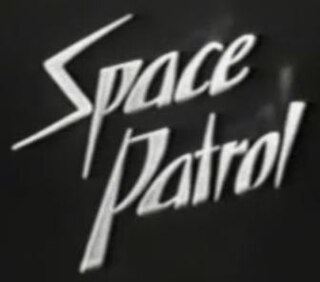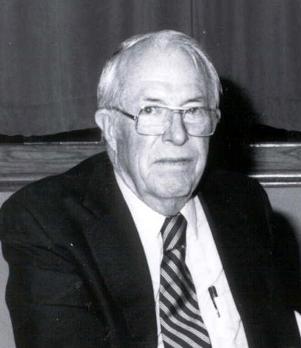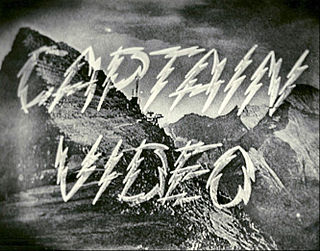
Murray Leinster was a pen name of William Fitzgerald Jenkins, an American writer of genre fiction, particularly of science fiction. He wrote and published more than 1,500 short stories and articles, 14 movie scripts, and hundreds of radio scripts and television plays.

Pebble in the Sky is a science fiction novel by American writer Isaac Asimov, published in 1950. This work is his first novel — parts of the Foundation series had appeared from 1942 onwards in magazines, but Foundation was not published in book form until 1951. The original Foundation books are also a string of linked episodes, whereas this is a complete story involving a single group of characters.

Space Patrol is an American science fiction adventure series set in the 30th century that was originally aimed at juvenile audiences via television, radio, and comic books. It was broadcast on ABC from March 1950 to February 1955. It soon developed a sizable adult audience, and by 1954 the program consistently ranked in the top 10 shows broadcast on a Saturday.

Lights Out is an American old-time radio program devoted mostly to horror and the supernatural.

John Stewart Williamson, who wrote as Jack Williamson, was an American science fiction writer, one of several called the "Dean of Science Fiction". He is also credited with one of the first uses of the term genetic engineering. Early in his career he sometimes used the pseudonyms Will Stewart and Nils O. Sonderlund.

X Minus One is an American half-hour science fiction radio drama series that was broadcast from April 24, 1955, to January 9, 1958, in various timeslots on NBC. Known for high production values in adapting stories from the leading American authors of the era, X Minus One has been described as one of the finest offerings of American radio drama and one of the best science fiction series in any medium.

Tom Corbett is the main character in a series of Tom Corbett—Space Cadet stories that were depicted in television, radio, books, comic books, comic strips, and other media in the 1950s.
U.S. television science fiction is a popular genre of television in the United States that has produced many of the best-known and most popular science fiction shows in the world. Most famous of all, and one of the most influential science-fiction series in history, is the iconic Star Trek and its various spin-off shows, which comprise the Star Trek franchise. Other hugely influential programs have included the 1960s anthology series The Twilight Zone, the internationally successful The X-Files, and a wide variety of television movies and continuing series for more than half a century.

Captain Video and His Video Rangers is an American science fiction television series that aired on the DuMont Television Network and was the first series of its genre on American television.

Weird Science was an American science fiction comic book magazine that was part of the EC Comics line in the early 1950s. Over a four-year span, the comic ran for 22 issues, ending with the November–December, 1953 issue. Weird Fantasy was a sister title published during the same time frame.

Arch Oboler was an American playwright, screenwriter, novelist, producer, and director who was active in radio, films, theater, and television. He generated much attention with his radio scripts, particularly the horror series Lights Out, and his work in radio remains the outstanding period of his career. Praised as one of broadcasting's top talents, he is regarded today as a key innovator of radio drama. Oboler's personality and ego were larger than life. Radio historian John Dunning wrote, "Few people were ambivalent when it came to Arch Oboler. He was one of those intense personalities who are liked and disliked with equal fire."

2000 Plus was an American old-time radio series that ran on the Mutual Broadcasting System from March 15, 1950, to January 2, 1952, in various 30-minute time slots. A Dryer Weenolsen production, it was the first adult science fiction series on radio, airing one month prior to the better-known Dimension X.
"The Veldt" is a science fiction short story by American author Ray Bradbury. Originally appearing as "The World the Children Made" in the September 23, 1950, issue of The Saturday Evening Post, it was republished under its current name in the 1951 anthology The Illustrated Man.

Tales of Tomorrow is an American anthology science fiction series that was performed and broadcast live on ABC from 1951 to 1953. The series covered such stories as Frankenstein starring Lon Chaney Jr., 20,000 Leagues Under the Sea starring Thomas Mitchell as Captain Nemo, and many others.
NBC Presents: Short Story is a half-hour American radio program offering dramatizations of contemporary American short stories that began on NBC on February 21, 1951, and ended on May 30, 1952.
Ernest Kinoy was an American writer, screenwriter and playwright.
Rocky Fortune is an American radio drama that aired weekly on NBC Radio beginning in October 1953. The series ended its run in March 1954 after 25 episodes. The program was created by George Lefferts. Frank Sinatra voiced the title role of Rocky Fortune for the entire series.
Dangerous Assignment was an NBC Radio drama starring Brian Donlevy broadcast in the US 1949–1953, a syndicated television series distributed in the US 1951–52, and an Australian radio series broadcast in 1954-56 as remakes of the original American radio scripts.
"The Rocket" is a science fiction short story by American writer Ray Bradbury. It is also included in The Illustrated Man, a collection of short stories by Ray Bradbury.
The Saint was a radio adventure program in the United States that featured a character created by author Leslie Charteris. As the program's introduction said, The Saint, was "known to millions from books, magazines, and motion pictures." Several versions of the program appeared on different networks.












